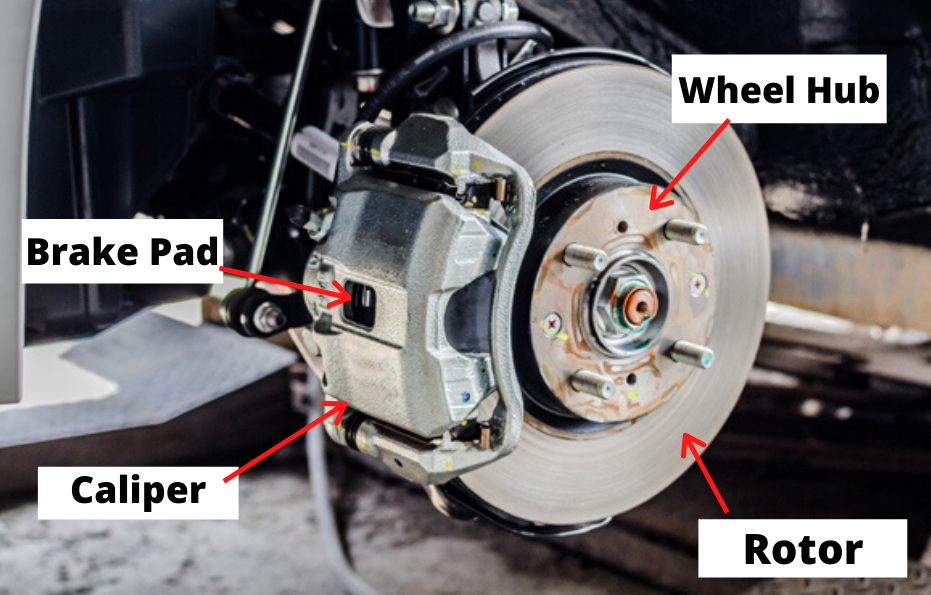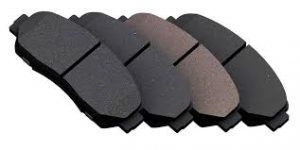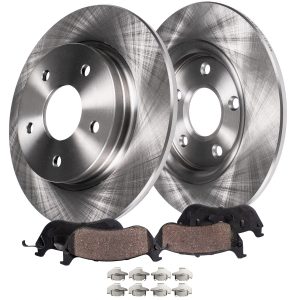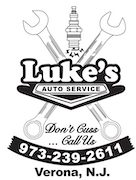

When it comes to a brake job, most people may not know how much actually goes into each and every vehicle. Let’s start off with one statement: There’s no such thing as a “one size fits all” brake pad or rotor! A brake job is not just a brake job because each vehicle requires different rotor and friction material. For example, full-size trucks or vans may need brake pads containing a substantial amount of metal to get extra power while braking and reduce wearing down of brakes. On the contrary, organic brake pads are perfect for the smooth operation of compact cars. You will first need to understand when you should replace your brakes and what brake pads and rotors are best for your vehicle and driving style.
Your brakes serve a very important purpose: stopping your vehicle. But there are choices to make when dealing with your brakes like having the right kind of brake pads and rotors.
Brake pads should be inspected at every major service interval or at every tire rotation service. However, every car is different and there are a variety of warning signs that can indicate you may need new brake pads.
5 Signs It’s Time to Have Your Brakes Inspected
- Squeaking noise coming from brakes
- A red indicator light turns on
- Grinding metal sound
- Vibrating brake pedal
- Brake pads appear less than a ¼ inch thick

Types of Brake Pads
- Semi-Metallic: This is the most common brake pad and they tend to be a great all-round choice for commuter vehicles. This specific brake pad has long-term durability and excellent heat transfer capability. However, since it contains 30% to 65% metal, it creates more noises and can wear out the rotors or drums faster.
- Organic: This brake pad contains fibers, high-temperature resins, and filler materials. They are softer and create less noise, but they do lose a lot of braking capacity when pulling a trailer or traveling long downhill routes.
- Fully metallic: These brake pads offer great braking in almost any condition, but do wear the rotors/drums faster.
- Ceramic: These are a great choice for most vehicles and offer the longest life. Ceramic brakes tolerate very high temperatures with very little fading or loss of braking when wet. These brake pads are a great all-around choice!
 Types of Brake Rotors
Types of Brake Rotors
Brake rotors can be made of different materials, each with its own advantages. Here are some of the most common brake rotor materials:
- Cast Iron: This is the most common material for brake rotors. The right design can even work well in a performance vehicle. However, it’s also the heaviest option, which affects the overall weight of your car and its handling.
- Steel: This has been the racer’s choice for years, because a steel brake rotor is thinner, weighs less and handles heat better. The downside: Steel rotors aren’t as durable as some others, and warped rotors can cause noise and bad vibration when you brake.
- Aluminum: These brake rotors dissipate heat quickly, but they also melt at a lower temperature than other options. Aluminum is a favorite for motorcycles, which weigh less and are easier on the rotors when braking than a heavy car, truck or SUV.
- High Carbon: These are iron, but with a lot of carbon mixed in. They can take a lot of heat and dissipate it quickly. The metallic content helps the rotor avoid cracking under high stress, and brake noise and vibration are reduced as well. The only downside is price, which is significantly higher than straight iron or aluminum.
- Ceramic: This is mainly used for high-performance vehicles. They offer the highest heat capacity and they maintain a more consistent force and pressure as the temperature of the rotors rises.
Remember that most manufacturers choose the best friction materials as well as rotor materials which they feel is best for their vehicle. However, if you use your vehicle in more extreme conditions, such as towing, stop and go traffic, and performance situations, you may want to choose a different rotor or friction material.
To prevent extensive brake repairs, have our technicians at Luke’s Auto Service inspect your braking system. Remember, keep an eye on the warning signs to stay proactive and safe during your travels. If you need to have your brake pads examined or if you have other reasons for concerns, call Luke’s Auto Service in Verona, NJ for all your brake needs.
References:
Images:
